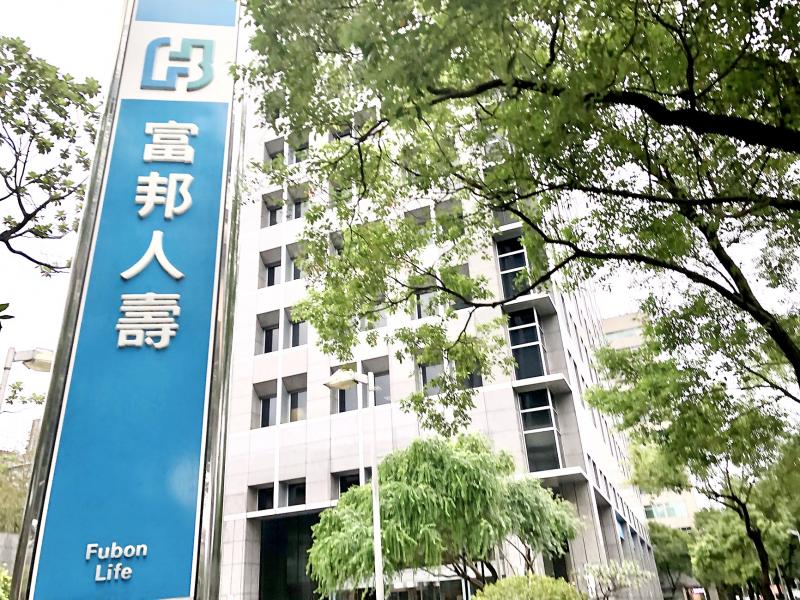Insurance-focused financial holding companies last month saw milder earnings growth compared with a year earlier, while their banking-focused peers reported steep declines in earnings, several companies’ earnings results released last week showed.
The latest data showed that insurance-focused firms’ earnings growth was less robust than a month earlier mainly due to lower dividend income and investment gains, as well as foreign exchange losses after the New Taiwan dollar gained 1.35 percent against the US dollar last month.
Fubon Financial Holding Co (富邦金控) reported net profit of NT$4.1 billion (US$141.48 million) for last month, which was flat from a year earlier, but down 69.1 percent from the NT$13.27 billion it earned a month ago.

Photo: Kelson Wang, Taipei Times
However, the company’s net profit in the first nine months of the year still led its peers at NT$68.11 billion, up 27 percent year-on-year. That translated into earnings per share of NT$6.37, a record high for the nine-month period in the company’s history.
That was mainly driven by its insurance arm, Fubon Life Insurance Co (富邦人壽), which saw its cumulative profit in the first nine months rise 65 percent annually to NT$45.2 billion on the back of solid investment gains.
Cathay Financial Holding Co (國泰金控) reported net profit of NT$4.68 billion for last month, the highest among its peers. However, the figure was lower than the NT$12.79 billion it reported in August.
In the first nine months, Cathay Financial’s cumulative profit came in at NT$64.37 billion, up 23.5 percent from a year earlier and lagging only behind Fubon Financial. Its earnings per share were NT$4.55, company data showed.
Its main profit-making engine, Cathay Life Insurance Co (國泰人壽), reported net profit of NT$2.54 billion for last month, up 20 percent from a year earlier, thanks to first-year premiums of NT$12.7 billion last month that led other insurers.
Last month, the insurance unit set aside an additional NT$2 billion in foreign-exchange volatility reserve that slightly pared its profit.
So far this year, Cathay Life has set aside a total of NT$7 billion in foreign-exchange volatility reserves, topping its peers as the NT dollar’s appreciation trend continues.
Overall, Cathay Life’s cumulative profit rose 46.6 percent to NT$44.81 billion in the first nine months, company data showed.
CTBC Financial Holding Co’s (中信金控) net profit rose 60 percent year-on-year to NT$4.18 billion last month on the back of a 53 percent profit increase of its subsidiary, Taiwan Life Insurance Co (台灣人壽保險). However, last month’s figure was still lower than the previous month’s due to less dividend income.
In the first nine months, CTBC Financial’s cumulative net profit was NT$36.13 billion, with earnings per share of NT$1.8, ranking third among its local peers.
Banking-focused holdings such as Mega Financial Holding Co (兆豐金控), First Financial Holding Co (第一金控) and E.Sun Financial Holding Co (玉山金控) posted steeper declines in net profit last month due to generally lower interest rate spreads, less capital gains from financial products and higher provision expenses.
E.Sun Financial saw its net profit hit a new monthly low at NT$1.2 billion last month, due to fewer financial product transactions and higher general provision expenses.
In the first nine months, E.Sun Financial’s net profit totaled NT$13.95 billion, down 11.6 percent year-on-year, with earnings per share of NT$1.11, dragged by E.Sun Commercial Bank’s (玉山銀行) 16.5 percent decline in profit over the same period.
Overall, the nation’s 15 financial holding companies saw their cumulative profit in the first nine months hit NT$303.997 billion, thanks to rising investment gains and dividend income.

Taiwan Transport and Storage Corp (TTS, 台灣通運倉儲) yesterday unveiled its first electric tractor unit — manufactured by Volvo Trucks — in a ceremony in Taipei, and said the unit would soon be used to transport cement produced by Taiwan Cement Corp (TCC, 台灣水泥). Both TTS and TCC belong to TCC International Holdings Ltd (台泥國際集團). With the electric tractor unit, the Taipei-based cement firm would become the first in Taiwan to use electric vehicles to transport construction materials. TTS chairman Koo Kung-yi (辜公怡), Volvo Trucks vice president of sales and marketing Johan Selven, TCC president Roman Cheng (程耀輝) and Taikoo Motors Group

Among the rows of vibrators, rubber torsos and leather harnesses at a Chinese sex toys exhibition in Shanghai this weekend, the beginnings of an artificial intelligence (AI)-driven shift in the industry quietly pulsed. China manufactures about 70 percent of the world’s sex toys, most of it the “hardware” on display at the fair — whether that be technicolor tentacled dildos or hyper-realistic personalized silicone dolls. Yet smart toys have been rising in popularity for some time. Many major European and US brands already offer tech-enhanced products that can enable long-distance love, monitor well-being and even bring people one step closer to

RECORD-BREAKING: TSMC’s net profit last quarter beat market expectations by expanding 8.9% and it was the best first-quarter profit in the chipmaker’s history Taiwan Semiconductor Manufacturing Co (TSMC, 台積電), which counts Nvidia Corp as a key customer, yesterday said that artificial intelligence (AI) server chip revenue is set to more than double this year from last year amid rising demand. The chipmaker expects the growth momentum to continue in the next five years with an annual compound growth rate of 50 percent, TSMC chief executive officer C.C. Wei (魏哲家) told investors yesterday. By 2028, AI chips’ contribution to revenue would climb to about 20 percent from a percentage in the low teens, Wei said. “Almost all the AI innovators are working with TSMC to address the

FUTURE PLANS: Although the electric vehicle market is getting more competitive, Hon Hai would stick to its goal of seizing a 5 percent share globally, Young Liu said Hon Hai Precision Industry Co (鴻海精密), a major iPhone assembler and supplier of artificial intelligence (AI) servers powered by Nvidia Corp’s chips, yesterday said it has introduced a rotating chief executive structure as part of the company’s efforts to cultivate future leaders and to enhance corporate governance. The 50-year-old contract electronics maker reported sizable revenue of NT$6.16 trillion (US$189.67 billion) last year. Hon Hai, also known as Foxconn Technology Group (富士康科技集團), has been under the control of one man almost since its inception. A rotating CEO system is a rarity among Taiwanese businesses. Hon Hai has given leaders of the company’s six